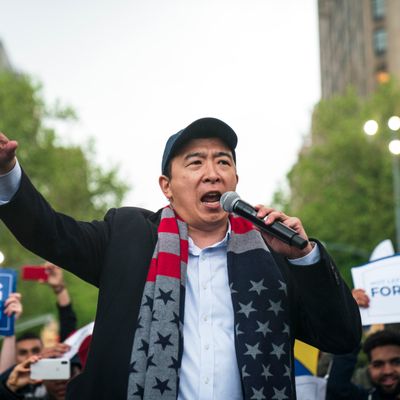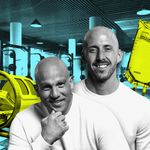
When Andrew Yang, the peppy UBI evangelist, dropped out of the presidential race last Tuesday, he immediately stoked speculation he was ready to seek another prestigious office: mayor of New York City.
“I would certainly not rule out running for office again,” Yang said, later intimating to the New York Times a run for mayor was a possibility.
Though the Manhattan tech entrepreneur and Columbia-educated lawyer came nowhere close to running competitively in either Iowa or New Hampshire — he garnered 1 and 2.8 percent of the vote, respectively — he outlasted Establishment favorites like Kamala Harris, qualified for most major television debates, and raised north of $30 million, all the while building a young, die-hard internet following known as the “Yang Gang.”
With a few stray remarks, Yang set New York’s insular political world aflutter. Is he serious? Will he do it? Can he win? Those close to Yang continue to fan the flames.
“Andrew isn’t taking anything off the table,” one Yang insider told Intelligencer. “The campaign-finance rules could be very advantageous to somebody like Andrew who understands the power of digital organizing and who could also talk to so many different constituencies in the city.”
Neal Kwatra, a prominent Democratic consultant unaffiliated with Yang, thinks he could have a real shot. “Anyone who underestimates his potential impact doesn’t understand the political moment we are in,” he said. Kwatra doesn’t think Yang will ultimately run, but believes New Yorkers would be “enamored with a fresh face” if he decides to take the plunge.
Yang’s energy and novelty could help him make a big splash in New York’s political pool, but he would still face some significant obstacles. The top three mayoral contenders — City Council Speaker Corey Johnson, City Comptroller Scott Stringer, and Brooklyn Borough President Eric Adams — are all courting key local constituencies that may view Yang skeptically. Yang never caught on with black voters. Traditional liberals gorging on MSNBC in the brownstone belt preferred Elizabeth Warren, Bernie Sanders, or Pete Buttigieg.
What would a Yang mayoral campaign look like? Like his presidential campaign, crammed with both big-ticket and obscure policy proposals (he took a few stances on circumcision), it wouldn’t be light on ideas. That said, he hasn’t weighed in with specifics on many core local concerns — for instance, we don’t know how Mayor Yang would, as he’s suggested, “de-emphasize” New York’s specialized high-school admissions exam, or how he’d manage the closure of Rikers Island. One certainty, meanwhile, would be his very-online fanbase’s relentless promotion of all things Yang — and pushback on his detractors.
UBI — or universal basic income — was, of course, the calling card of Yang’s presidential campaign. If elected, Yang promised to give $1,000 a month to every American citizen, rich and poor alike, no questions asked. The “freedom dividend,” as Yang cannily rebranded it, appealed to some progressive and more libertarian-minded voters: Everyone from right-wing economist Milton Friedman to Martin Luther King Jr. had championed the idea as a way to eliminate poverty. Yang’s overriding concern has been ensuring automation doesn’t worsen the already precarious state of the low-wage worker.
Yang has already signaled a willingness to bring a version of UBI to the five boroughs, but pushing his signature issue in New York would likely create some complicated dynamics with voters on the left that could cost him in the Democratic primary. Among the increasingly vocal progressive organizations and activists who could, in theory, be open to a Yang candidacy, there would be new scrutiny of UBI, which would fund the cash payments, in part, by downsizing the traditional social-welfare services that poor New Yorkers rely on.
“There’s a cleavage between progressives pushing it for progressive reasons and libertarians and right-wingers being wolves in sheep’s clothing, pushing it as an excuse to eviscerate the safety net,” said Joel Berg, the CEO of Hunger Free America and a longtime city activist. “Unfortunately, Yang comes out of that tradition, whether he knows it or not.”
Yang’s competition, who won’t view him as a sentimental long shot, would attack him from the start. Negative ads could shred Yang for trying to rip food stamps away from needy families. The Westchester County native would also face questions about why he didn’t vote in New York between 2008 and 2016.
During his presidential campaign, Yang was unable to peel a significant number of voters away from Bernie Sanders or Elizabeth Warren — voters who make up the progressive base critical to any insurgent mayoral coalition in New York. But there is also reason to think he’d at least have a chance to overcome progressive skepticism and attract a meaningful share of support in the city.
“Most progressives and leftists look at Andrew Yang and see someone who is basically motivated by the right things,” said Karthik Ganapathy, a progressive strategist and former Sanders aide. “Other parts of his proposed solutions to broad structural problems are actually not that helpful and are quite regressive in a pretty serious way.”
Yang would bring obvious strengths to a mayoral campaign. He is more famous than any of his potential rivals. He has a million followers on Twitter. And the city’s 8:1 public-matching funds system will, indeed, be a boon to a candidate who was powered by small donors online.
Candidate Yang would likely be an immediate draw in the city’s booming Asian community, particularly among Chinese-American voters. “Of course he’s viable!” gushed State Senator John Liu, the first and only Asian-American to ever win citywide office and a former mayoral contender himself. “Andrew is our Shirley Chisolm.”
The introduction of ranked-choice voting into the 2021 mayoral race would probably boost a celebrity candidacy like Yang’s, since voters in New York are less familiar with their local officials. Name recognition can take a candidate far: Before a second sexting scandal destroyed his 2013 campaign, the infamous Anthony Weiner was a consistent leader in the polls.
Yang is still a long way from making any kind of decision though. He could forego New York altogether for a national role — public speaker, think-tanker, or anything with the kind of prestige that wouldn’t require him to slug it out with a handful of seasoned pols who would immediately take his candidacy seriously and try to cut him down.
“I’m willing to sit down with him, just as I did before he launched his presidential campaign,” said Ron Kim, a Queens assemblyman and early Sanders backer. “To see if we are aligned on local issues.”





























